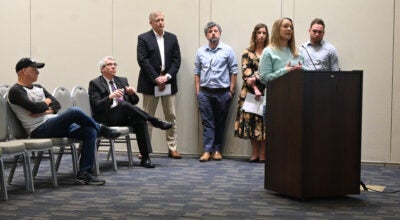City Council concludes draft of new procedural rules
Published 12:00 am Thursday, October 4, 2018
SALISBURY — In a special meeting Wednesday, City Council members discussed suggested procedural rules for four hours and came to a consensus on agenda items and order.
With City Attorney Graham Corriher, City Manager Lane Bailey and City Clerk Diane Gilmore, the five council members talked through parts of the suggested rules, including additions, rewrites and deletions. The council will consider approval of the rules at its Oct. 16 meeting.
One discussion related to how items are added to the meeting agenda. Mayor Pro Tem David Post and Councilman Brian Miller said they think items should be “seconded” to appear on the agenda.
“If I’m going to bring anything to the body for a decision, I’m going to build a consensus,” Miller said. “I’ve never done this in this period of time even to ask for something to be on the agenda. I’m not going to do anything until at least I know I have support. The idea for me of putting something on the agenda without knowing that you have someone else that wants to talk about it is ridiculous. The idea of requiring a second makes sense.”
Post said he is concerned that a council member would repeatedly add items that are not supported by other council members and therefore would be a waste of time.
Mayor Al Heggins and Councilwomen Tamara Sheffield and Karen Alexander argued that they are OK with a single member adding agenda items.
“That doesn’t mean that one council member’s plans aren’t important to citizens,” Sheffield said. “It just means that you have four against that person’s opinion.”
Alexander said she doesn’t think a second is need, especially after council members agreed to strike through a second motion before heading into a vote.
“I would say for consistency, if we’re not going to require a second in putting a motion forward then I don’t think we need to have a motion for putting something on the agenda,” Alexander said. “It’s either going to live or die based on the vote.”
Bailey said each council member represents a portion of Salisbury residents.
“Each of you are elected,” Bailey said. “Each of you are 20 percent of the board. That’s still a significant — it’s a minority, but it’s a significant minority.”
The council decided that one person could add an item to the agenda.
Members also launched into a debate about the agenda packet and when it should be completed for the council, the press and residents. The recommendation from the the N.C. School of Government and council members varied on when the material should be ready to review.
Post said he would ideally like the agenda and the agenda packet to be released together. Alexander said she needs time to review the packet ahead of council meetings.
“If we don’t get information in some kind of timely manner that we have the chance to review, is it really fair for us to be voting on an issue that we haven’t had time to think about it?” Alexander said.
Heggins said council members could ask for an agenda item to be pushed to the next meeting if they don’t feel they have had time to prepare. She added the council as a whole needs to decide how much time members need to review the agenda packet.
“This isn’t about the pleasure of the mayor,” Heggins said. “This is about the pleasure of the council and the council having enough time to get the information that they need. I don’t think this is a mayor decision. It’s about what’s best for the council in terms of having time to review that information, make ourselves familiar with the information. So if any mayor ever said you could do (that) the day before, I would hope the council would protest.”
Sheffield said she would like to have proclamations in the agenda packet to be able to congratulate residents who are the subject of a proclamation and know what the council is supporting.
“We’re all asked to stand for the proclamation, which means we’re behind you, because they are mayoral proclamations. But if I don’t know what it is, it’s like you’re put on the spot to have to stand and agree if I didn’t know what it was,” Sheffield said.
The council agreed the agenda packet should be sent out seven days before a meeting and a note that additional information will be provided ahead of the meeting.
The council discussed when public comment should take place during meetings. Members said they would like to either have public comment at the beginning or the end of the meeting instead of at 6 p.m. because often that falls between discussion of two agenda items and can be awkward and distracting.
Council members talked about how to ensure the public-comment period is convenient for residents and cited up examples of how the Rowan County commissioner and school board handle it.
Alexander suggested that at the first meeting of the month, the comment period could be at the beginning and at the second meeting, it could be at the end.
Heggins said she does not want to have public comment before 6 p.m.
Post and Miller said if the issue a resident wants to talk about is important, he generally will find a way to attend the meeting. They said comment could also come by phone or email.
“If it’s a big deal, people will be here,” Post said.
The council agreed to come back to the issue of the meeting time, since it doesn’t fall under the suggested procedural rules.
Corriher will edit the suggested rules according to the council’s decisions, which will be voted on at the next City Council meeting.




